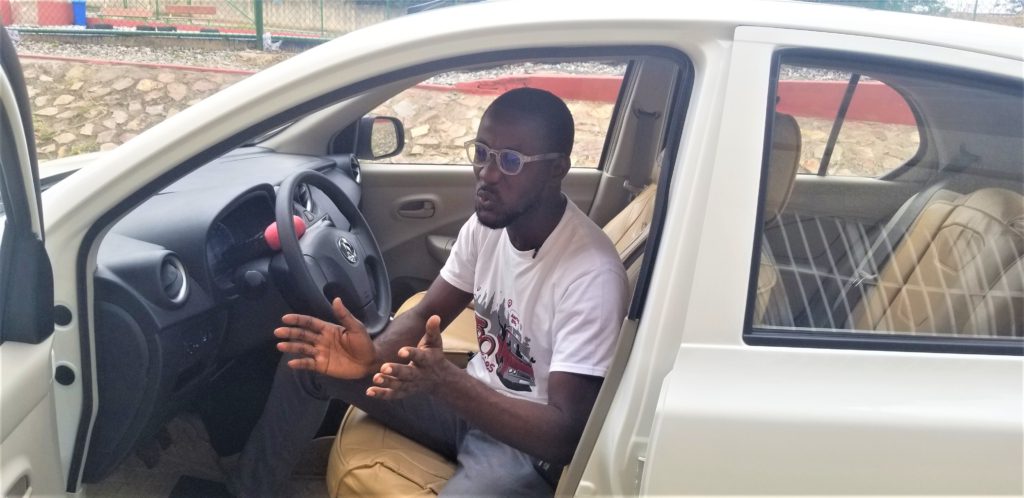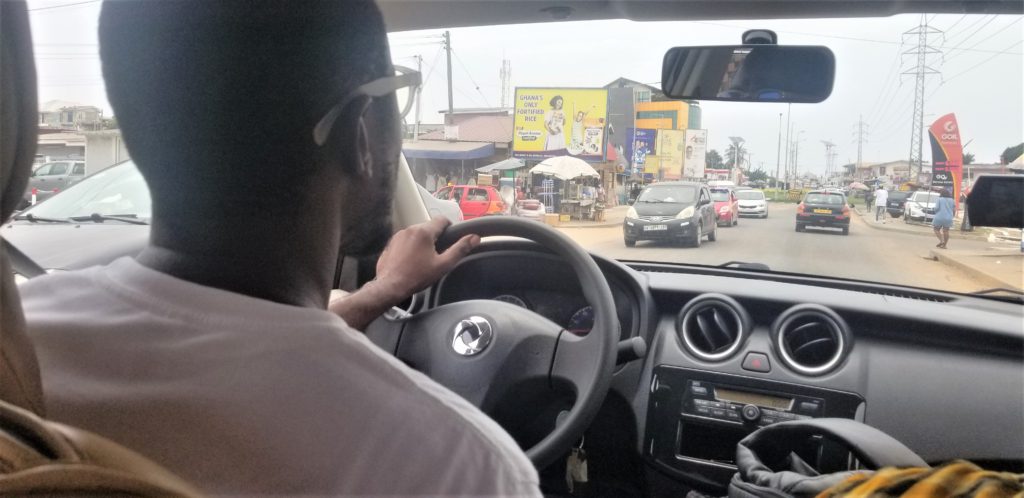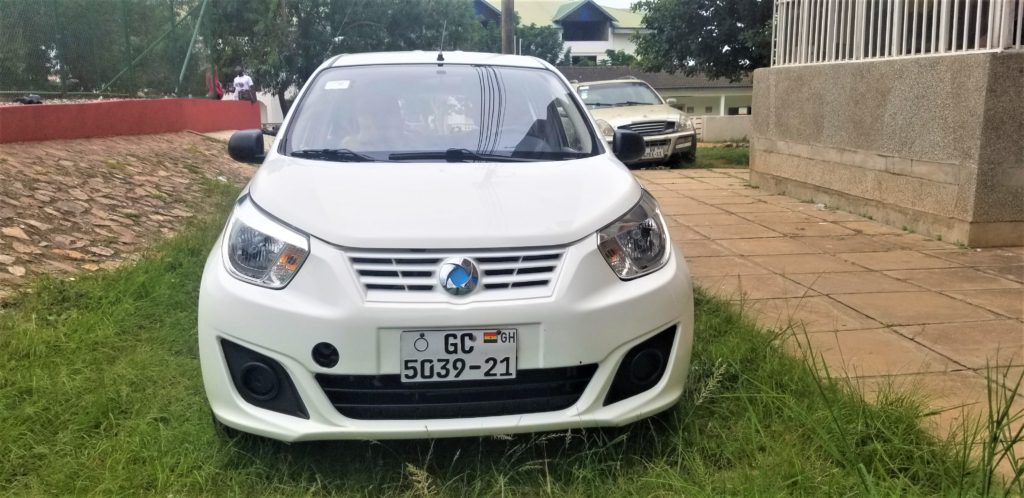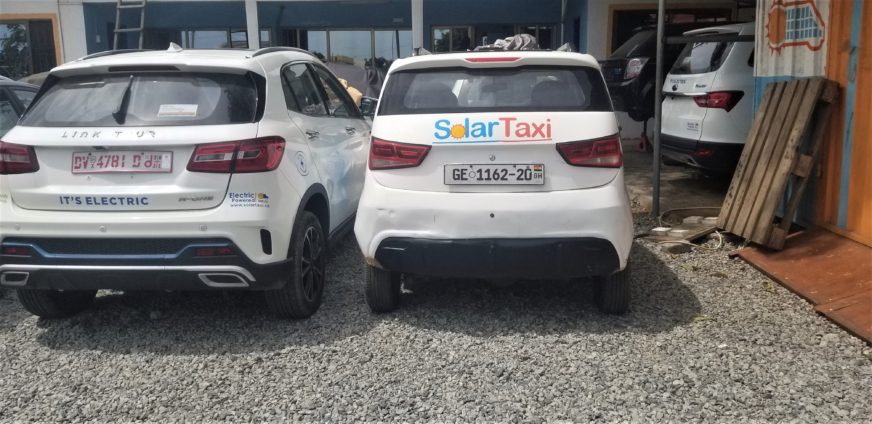Yaw Odoom has had enough horrid experience, inhaling smoke from vehicles. One day, he began flooding his Facebook wall with his daily experiences- trauma and discomfort, about public transport services in Ghana’s capital, Accra.
Little did he know that he would be championing the patronage of electrical vehicles in Ghana.
“It actually started unofficially in 2011, on my Facebook wall, where I started sharing some funny personal experiences from my trotro (public vehicle) commute,” Odoom said of his Trotro Dairies page. I realised there are a lot of people that are having a similar experience and they identified with it, too, and it turns out that it's not just in Ghana. Then a couple of friends just mentioned, okay, it would be a great idea to turn into a page or group. I decided to go the group path.”
Trotro Dairies is Ghana’s largest virtual community of commuters where commuters can jump on board, and then crowdsource any public transportation information they need. The group has since September, 2011 supported commuters with information on decent public transport options, road safety alerts, and sometimes provided emergency medical responses to accident victims across Ghana with simple posts of either image, texts, or short skirts to over five thousand online users.
“In 2019, Facebook recognised Trotro Dairies as one of the most relevant and meaningful communities across Africa in the Icons of Change Campaign. We had a community base of about 20,000 at the beginning of 2017. Currently, we are almost at 500,000. And we've been able to work with the Accra Metropolitan Assembly on a project called the pedestrian road safety plan for Accra and all that. Recently, we got selected for the UNICEF, Ghana start-up lab,” the founder and community manager of Trotro Diaries told ZAMI REPORTS.
After gathering this huge following on Facebook, Yaw Odoom and his team began brainstorming on strategies to improve the traveling experiences of their followers.

He said: “I think across the world, we are looking at decarbonisation and climate action and when we saw what solar taxi was doing, we thought it would be a good partnership. We’re are looking at ourselves more as a transportation ecosystem than just being a transport app. So basically, the idea is that instead of having different people take one car each, we are looking at being able to group our community members based on their locations and similar routes. So that the idea will be that one of these vehicles will go to their points, pick them, take them to work and back. We’re trying to price around that space of Trotro so that it will be easier for people to transition to this environmentally friendly option.”
Trotro Dairies in August communicated plans to commence its eco-friendly transport services with electric cars from Solar-taxi, but this announcement exposed teething issues, among them; the lack of interest in the product. However, with determination to complement climate change action, the team dared the odds.
“Most people did not know about electric vehicles; people didn't even know they existed in Ghana. I think, probably Trotro Diaries has probably done the most education when it comes to electric vehicles in Ghana. I did a trip to Pokuase, Tema, and Kasoa Castle and basically, we wanted people to be able to understand. For us, it just pushing people to patronize electric vehicles because it is more friendly for the environment.,” Odoom said.
Some 170 followers have currently signed up for the trotro experience in electric vehicles and that will transcend into a cut in fossil fuel emissions in Ghana.
“We were trying to solve the issues of climate change and unsafe transportation, and so we came up with our first prototype, whereby we have a solar panel on top of a car and then powered by batteries. We secured funding from MasterCard Foundation and that was our first phase of traction,” the operations officer of Solar-Taxi, Eugene Amponsah said.

Since 2019, Solar-Taxi has scaled up its importation of electric vehicles which are partially assembled in Ghana, and motorbikes that are entirely assembled in Ghana. It currently has some 60 electric vehicles and 150 motorbikes purchased across Ghana.
While Africa has contributed negligibly to the changing climate, with just about two to three percent of global emissions, it stands out disproportionately as the most vulnerable region in the world. This vulnerability is driven by the prevailing low levels of socioeconomic growth on the continent. While climate change is global, the poor are disproportionately vulnerable to its effects. This is because they lack the resources to afford goods and services they need to buffer themselves and recover from the worst of the changing climate effects, according to the United Nations Environment Programme.
In 2015, 195 countries adopted the first-ever universal and legally binding agreement, called Paris Agreement, to strengthen the global response to the threat of climate change. The agreement requires all Parties to outline their commitments in the form of Nationally Determined Contributions (NDC). Ghana committed to pursuing coordinated actions to reduce the negative impacts of climate. The NDC contains a set of 31 climate actions covering seven sectors with a budget of $22.6 billion for a 10-year period starting from 2020. Some
Countries are mandated by Article 4.9 of the Paris Agreement to revise their NDCs every five years. The project focuses on Strengthening sectoral Monitoring, Reporting, and Verification (MRV) systems to ensure transparent NDC implementation, Refining and disaggregating economy-wide NDC mitigation targets as sectoral targets and achievable actions, and developing sectoral mitigation plans, Identifying inclusive policy instruments to reduce risks and incentivize participation of private sector in NDC implementation, Integrating gender in NDC planning and implementation processes within the broader sustainable development context.
The Government of Ghana in September, 2020, launched the revision process of Ghana’s Nationally Determined Contributions (NDCs) to strengthen the implementation of national priorities on climate change adaptation and mitigation to achieve low carbon development in the country. The revision offered a good opportunity for Ghana to raise its ambition and integrate emerging policies into climate change actions at the national level. The country approved $54.5million from the Green Climate Fund (GCF) to help communities in Northern Ghana adapt to climate change.
Efforts and private partnerships like the one that exists between Trotro Dairies and Solar-Taxi fall under one of the NDCs in combating climate change.
“Initially, people were reserved about it with questions like “won’t I get shocked if it rains? Where am I going to charge all these things? but we've been able to solve all these issues tackled all these issues, and now people are comfortable with it,” Amponsah added.

Ghana’s recent data on carbon dioxide- fossil emission is dated 2016 and stood at 14,469,986 tons. CO2 emissions increased by 3.54% over the previous year, representing an increase of 495,166 tons over 2015, when CO2 emissions were 13,974,820 tons. CO2 emissions per capita in Ghana are equivalent to 0.51 tons per person (based on a population of 28,481,945 in 2016), an increase by 0.01 over the figure of 0.50 CO2 tons per person registered in 2015; this represents a change of 1.2% in CO2 emissions per capita. Globally, the figures stood at 35,753,305,000 tons, Change +0.34%, Per capita 4.79 tons in the same year, according to worldometers.info.
A journalist and environmental activist Kofi Adu Domfeh argued that initiatives like Solar-Taxi’s electric vehicles and Trotro Dairies’ partnership is key for developing countries to cut emission.
“This is surely a laudable initiative, looking at the rate of pollution from conventional vehicles. The high consumption of fossil fuels in the automobile industry can be reduced with the promotion of innovations like Solar Taxi. This is a safe alternative to environmental pollution, especially in Ghana where most vehicles are second-hand imports with high fuel consumption and high emissions of carbon dioxide.”
“I surely will love to own an electric car as a conviction to promoting a healthy environment. If the local infrastructure, especially setting up electric fuel stations, supports the use of electric cars, it would be worth owning an electric car. It is safe and a good way to reduce the use of fossils,” Domfeh added.
But Solar-Taxi faces high import duties which forces the company to push the cost to the consumer. This defeats their vision of protecting the environment. These taxes can be cut if Solar-Taxi begins the complete assembling of the vehicles locally.
“They (government) term these cars as luxury vehicles and tax them high so the taxes inform the prices.”
As long ago as 2009, the developed world agreed it would provide $100bn a year by 2020 to help poorer countries deal with the effects of climate change and build greener economies in the future. But, although official figures have not yet been released, an expert report commissioned by the United Nations concludes the target has not been reached - even though a new and more ambitious target is now supposed to be set for 2025.
“Ghana, like most other developing countries, remains most vulnerable to the impacts of climate change. In Ghana’s Nationally Determined Contribution to the United Nations Framework Convention on Climate Change, the country needs $22.6 billion in investments to finance its climate mitigation and adaptation actions between 2020 and 2030,” the environment activist - Domfeh insisted.
The writer is a climate change fellow under the NAREP Climate Change Media 2021 fellowship of the Premium Times Centre for Investigative Journalism.
Latest Stories
-
Do not forget our roads – Penyi Traditional Authorities to government
43 minutes -
More than 400 killed by rebels in Sudan says UN
47 minutes -
‘Bawku deserves peace’ – Minority calls for depoliticisation as conflict escalates
1 hour -
‘A standoff with police is a dangerous new trend’ – Minority on security forces attacks in Bawku
2 hours -
Trump freezes $2bn in Harvard funding after university rejects demands
4 hours -
Ant smugglers caught with hundreds of prized insects in Kenya
4 hours -
Couple arrested for breeding exotic cats in Spain
5 hours -
Harvard rejects Trump administration’s sweeping demands for change
5 hours -
Palestinian student activist arrested at US citizenship interview
5 hours -
Semenyo strike gives Bournemouth win over Fulham
6 hours -
Latif Iddrisu vs IGP: ‘You were not referred for advanced medical attention’ — AG tells journalist
6 hours -
Modric becomes Swansea ‘investor and co-owner’
6 hours -
Villa can write themselves into history – Emery
6 hours -
Newcastle boss Howe recovering from pneumonia
6 hours -
Richard Kwabena Asare: Driving Ghana’s economic growth through public sector financing
7 hours

